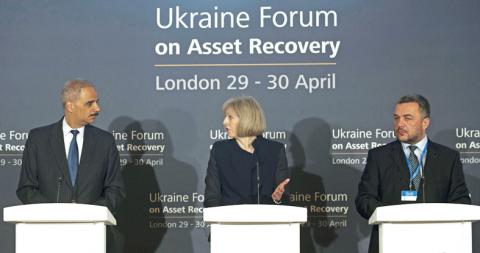The EU yesterday broadened sanctions on Russia, imposing asset freezes and visa bans on 15 Russian officials and Ukrainian rebel leaders, but many EU states are wary of going further and applying more intense economic pressure on Russia.
The EU targeted a number of high-ranking Russian officials, including Deputy Prime Minister Dmitry Kozak and General Valery Gerasimov and pro-Russian separatist leaders in eastern Ukraine, but steered clear of sanctions on business leaders.
The decision brings to 48 the number of people that the EU has put under sanctions for actions it says have undermined Ukraine’s territorial integrity.

Photo: EPA
EU High Representative for Foreign Affairs and Security Policy Catherine Ashton said developments in eastern Ukraine ran counter to the agreement reached by Ukraine, Russia, the US and the EU in Geneva earlier this month aimed at defusing the crisis.
“I call on Russia to take now concrete action in support of the Geneva accord,” she said in a statement.
Russia said the EU should be ashamed of itself for “doing Washington’s bidding” by punishing Moscow with sanctions and the self-declared mayor of a separatist-held town in eastern Ukraine said he would discuss the release of detained military observers with the West only if the EU dropped sanctions against rebel leaders.
EU ambassadors are to meet again today in Brussels to discuss Ukraine and will consider adding more names to the sanctions list, diplomats said.
They will also look at broadening the legal basis of EU sanctions to permit the bloc to target companies, not just individuals.
Meanwhile, hundreds of pro-Russian separatists stormed the regional government headquarters in the eastern city of Luhansk, unopposed by police, and the Ukrainian government said the separatists also planned to seize the local television center.
The government in Kiev has all but lost control of its police forces in parts of eastern Ukraine, where pro-Russian activists have seized buildings in the region’s second-biggest city of Donetsk and several smaller towns.
“The regional leadership does not control its police force,” said Stanislav Rechynsky, an aide to Ukrainian Interior Minister Arsen Avakov. “The local police did nothing.”
In other developments, the US and Britain yesterday said they were determined to track down billions of dollars of Ukrainian assets allegedly looted under the regime of former Ukrainian president Viktor Yanukovych.
US Attorney General Eric Holder and British Home Secretary Theresa May told an international conference on asset recovery that those responsible would be held accountable.
“There should be no mistake, we are determined in our efforts to be successful,” Holder told a press conference in London at the start of the two-day forum.
Ukrainian Prosecutor-General Oleh Makhnitskyi told the forum that Kiev has already identified stolen assets of at least 35 billion Ukrainian hryvnias (US$3 billion), but he expects the eventual total to amount to tens of billions of dollars.
Additional reporting by AFP

The Ministry of the Interior (MOI) is to tighten rules for candidates running for public office, requiring them to declare that they do not hold a Chinese household registration or passport, and that they possess no other foreign citizenship. The requirement was set out in a draft amendment to the Enforcement Rules of the Public Officials Election and Recall Act (公職人員選舉罷免法 ) released by the ministry on Thursday. Under the proposal, candidates would need to make the declaration when submitting their registration forms, which would be published in the official election bulletin. The move follows the removal of several elected officials who were

The Republic of China (ROC) is celebrating its 114th Double Ten National Day today, featuring military parades and a variety of performances and speeches in front of the Presidential Office in Taipei. The Taiwan Taiko Association opened the celebrations with a 100-drummer performance, including young percussionists. As per tradition, an air force Mirage 2000 fighter jet flew over the Presidential Office as a part of the performance. The Honor Guards of the ROC and its marching band also heralded in a military parade. Students from Taichung's Shin Min High School then followed with a colorful performance using floral imagery to represent Taiwan's alternate name

FOUR DESIGNATED AREAS: Notices were issued for live-fire exercises in waters south and northwest of Penghu, northeast of Keelung and west of Kaohsiung, they said The military is planning three major annual exercises across the army, navy and air force this month, with the navy’s “Hai Chiang” (海強, “Sea Strong”) drills running from today through Thursday, the Ministry of National Defense said yesterday. The Hai Chiang exercise, which is to take place in waters surrounding Taiwan, would feature P-3C Orion maritime patrol aircraft and S-70C anti-submarine helicopters, the ministry said, adding that the drills aim to bolster the nation’s offshore defensive capabilities. China has intensified military and psychological pressure against Taiwan, repeatedly sending warplanes and vessels into areas near the nation’s air defense identification zone and across

A Chinese takeover of Taiwan would severely threaten the national security of the US, Japan, the Philippines and other nations, while global economic losses could reach US$10 trillion, National Security Council Deputy Secretary-General Lin Fei-fan (林飛帆) wrote in an article published yesterday in Foreign Affairs. “The future of Taiwan is not merely a regional concern; it is a test of whether the international order can withstand the pressure of authoritarian expansionism,” Lin wrote in the article titled “Taiwan’s Plan for Peace Through Strength — How Investments in Resilience Can Deter Beijing.” Chinese President Xi Jinping’s (習近平) intent to take Taiwan by force